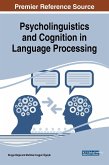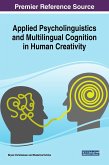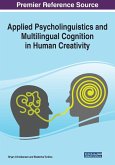- Broschiertes Buch
- Merkliste
- Auf die Merkliste
- Bewerten Bewerten
- Teilen
- Produkt teilen
- Produkterinnerung
- Produkterinnerung
In the World Library of Psychologists series, international experts present career-long collections of what they judge to be their most interesting publications - extracts from books, key articles, research findings, and practical and theoretical contributions.
Andere Kunden interessierten sich auch für
![The Psycholinguistics of Words, Sentences and Discourse The Psycholinguistics of Words, Sentences and Discourse]() Carlos Acuña-FariñaThe Psycholinguistics of Words, Sentences and Discourse176,99 €
Carlos Acuña-FariñaThe Psycholinguistics of Words, Sentences and Discourse176,99 €![Pseudology Pseudology]() Marcel DanesiPseudology158,99 €
Marcel DanesiPseudology158,99 €![The Origin Of Thought And Speech (1905) The Origin Of Thought And Speech (1905)]() M. MoncalmThe Origin Of Thought And Speech (1905)30,99 €
M. MoncalmThe Origin Of Thought And Speech (1905)30,99 €![Psycholinguistics and Cognition in Language Processing Psycholinguistics and Cognition in Language Processing]() Psycholinguistics and Cognition in Language Processing179,99 €
Psycholinguistics and Cognition in Language Processing179,99 €![Plain Language Plain Language]() Stefano RastelliPlain Language169,99 €
Stefano RastelliPlain Language169,99 €![Applied Psycholinguistics and Multilingual Cognition in Human Creativity Applied Psycholinguistics and Multilingual Cognition in Human Creativity]() Applied Psycholinguistics and Multilingual Cognition in Human Creativity169,99 €
Applied Psycholinguistics and Multilingual Cognition in Human Creativity169,99 €![Applied Psycholinguistics and Multilingual Cognition in Human Creativity Applied Psycholinguistics and Multilingual Cognition in Human Creativity]() Applied Psycholinguistics and Multilingual Cognition in Human Creativity126,99 €
Applied Psycholinguistics and Multilingual Cognition in Human Creativity126,99 €-
-
-
In the World Library of Psychologists series, international experts present career-long collections of what they judge to be their most interesting publications - extracts from books, key articles, research findings, and practical and theoretical contributions.
Produktdetails
- Produktdetails
- Verlag: Routledge
- Seitenzahl: 336
- Erscheinungstermin: 29. September 2025
- Englisch
- Abmessung: 229mm x 152mm x 19mm
- Gewicht: 488g
- ISBN-13: 9781032535128
- ISBN-10: 1032535121
- Artikelnr.: 75235723
- Herstellerkennzeichnung
- Libri GmbH
- Europaallee 1
- 36244 Bad Hersfeld
- gpsr@libri.de
- Verlag: Routledge
- Seitenzahl: 336
- Erscheinungstermin: 29. September 2025
- Englisch
- Abmessung: 229mm x 152mm x 19mm
- Gewicht: 488g
- ISBN-13: 9781032535128
- ISBN-10: 1032535121
- Artikelnr.: 75235723
- Herstellerkennzeichnung
- Libri GmbH
- Europaallee 1
- 36244 Bad Hersfeld
- gpsr@libri.de
Ellen Bialystok is a Distinguished Research Professor of Psychology at York University and Associate Scientist at the Rotman Research Institute of Baycrest. She is an Officer of the Order of Canada (OC), a Fellow of the Royal Society of Canada (FRSC), and a Killam Prize laureate. She also holds an honorary doctorate (Doctor Philosophiae Honoris Causa) from the University of Oslo and is the recipient of numerous other awards and fellowships.
Part I: Metalinguistic and cognitive development in children Chapter 1.
Factors in the growth of linguistic awareness Chapter 2. Independent
effects of bilingualism and socioeconomic status on language ability and
executive functioning Part II: Behavioral studies across the lifespan
Chapter 3. Bilingualism, aging, and cognitive control: Evidence from the
Simon task Chapter 4. Cognitive control and lexical access in younger and
older bilinguals Part III: Including the brain Chapter 5. Bilingualism:
Consequences for mind and brain Chapter 6. The bilingual adaptation: How
minds accommodate experience Part IV: The cognitive reserve effect Chapter
7. Bilingualism as a protection against the onset of symptoms of dementia
Chapter 8. Bilingualism: Pathway to cognitive reserve Part V: Mechanisms
and implications: What's going on and why does it matter? Chapter 9.
Increases in attentional demands are associated with language group
differences in working memory performance Chapter 10. The swerve: How
childhood bilingualism changed from liability to benefit
Factors in the growth of linguistic awareness Chapter 2. Independent
effects of bilingualism and socioeconomic status on language ability and
executive functioning Part II: Behavioral studies across the lifespan
Chapter 3. Bilingualism, aging, and cognitive control: Evidence from the
Simon task Chapter 4. Cognitive control and lexical access in younger and
older bilinguals Part III: Including the brain Chapter 5. Bilingualism:
Consequences for mind and brain Chapter 6. The bilingual adaptation: How
minds accommodate experience Part IV: The cognitive reserve effect Chapter
7. Bilingualism as a protection against the onset of symptoms of dementia
Chapter 8. Bilingualism: Pathway to cognitive reserve Part V: Mechanisms
and implications: What's going on and why does it matter? Chapter 9.
Increases in attentional demands are associated with language group
differences in working memory performance Chapter 10. The swerve: How
childhood bilingualism changed from liability to benefit
Part I: Metalinguistic and cognitive development in children Chapter 1. Factors in the growth of linguistic awareness Chapter 2. Independent effects of bilingualism and socioeconomic status on language ability and executive functioning Part II: Behavioral studies across the lifespan Chapter 3. Bilingualism, aging, and cognitive control: Evidence from the Simon task Chapter 4. Cognitive control and lexical access in younger and older bilinguals Part III: Including the brain Chapter 5. Bilingualism: Consequences for mind and brain Chapter 6. The bilingual adaptation: How minds accommodate experience Part IV: The cognitive reserve effect Chapter 7. Bilingualism as a protection against the onset of symptoms of dementia Chapter 8. Bilingualism: Pathway to cognitive reserve Part V: Mechanisms and implications: What's going on and why does it matter? Chapter 9. Increases in attentional demands are associated with language group differences in working memory performance Chapter 10. The swerve: How childhood bilingualism changed from liability to benefit
Part I: Metalinguistic and cognitive development in children Chapter 1.
Factors in the growth of linguistic awareness Chapter 2. Independent
effects of bilingualism and socioeconomic status on language ability and
executive functioning Part II: Behavioral studies across the lifespan
Chapter 3. Bilingualism, aging, and cognitive control: Evidence from the
Simon task Chapter 4. Cognitive control and lexical access in younger and
older bilinguals Part III: Including the brain Chapter 5. Bilingualism:
Consequences for mind and brain Chapter 6. The bilingual adaptation: How
minds accommodate experience Part IV: The cognitive reserve effect Chapter
7. Bilingualism as a protection against the onset of symptoms of dementia
Chapter 8. Bilingualism: Pathway to cognitive reserve Part V: Mechanisms
and implications: What's going on and why does it matter? Chapter 9.
Increases in attentional demands are associated with language group
differences in working memory performance Chapter 10. The swerve: How
childhood bilingualism changed from liability to benefit
Factors in the growth of linguistic awareness Chapter 2. Independent
effects of bilingualism and socioeconomic status on language ability and
executive functioning Part II: Behavioral studies across the lifespan
Chapter 3. Bilingualism, aging, and cognitive control: Evidence from the
Simon task Chapter 4. Cognitive control and lexical access in younger and
older bilinguals Part III: Including the brain Chapter 5. Bilingualism:
Consequences for mind and brain Chapter 6. The bilingual adaptation: How
minds accommodate experience Part IV: The cognitive reserve effect Chapter
7. Bilingualism as a protection against the onset of symptoms of dementia
Chapter 8. Bilingualism: Pathway to cognitive reserve Part V: Mechanisms
and implications: What's going on and why does it matter? Chapter 9.
Increases in attentional demands are associated with language group
differences in working memory performance Chapter 10. The swerve: How
childhood bilingualism changed from liability to benefit
Part I: Metalinguistic and cognitive development in children Chapter 1. Factors in the growth of linguistic awareness Chapter 2. Independent effects of bilingualism and socioeconomic status on language ability and executive functioning Part II: Behavioral studies across the lifespan Chapter 3. Bilingualism, aging, and cognitive control: Evidence from the Simon task Chapter 4. Cognitive control and lexical access in younger and older bilinguals Part III: Including the brain Chapter 5. Bilingualism: Consequences for mind and brain Chapter 6. The bilingual adaptation: How minds accommodate experience Part IV: The cognitive reserve effect Chapter 7. Bilingualism as a protection against the onset of symptoms of dementia Chapter 8. Bilingualism: Pathway to cognitive reserve Part V: Mechanisms and implications: What's going on and why does it matter? Chapter 9. Increases in attentional demands are associated with language group differences in working memory performance Chapter 10. The swerve: How childhood bilingualism changed from liability to benefit








